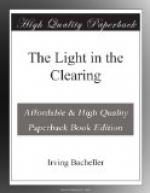“The Senator! God prosper him! I hear that he came on the Plattsburg stage last night,” he said as he began the reading—an announcement which caused me and the children to clap our hands with joy.
Mr. Hacket thoughtfully repeated the words from Job with a most impressive intonation.
He passed the letter back to me and said:
“All true! I have seen it sinking into the bones o’ the young and I have seen it lying down with the aged in the dust o’ their graves. It is a big book—the one we are now opening. God help us! It has more pages than all the days o’ your life. Just think o’ your body, O brave and tender youth! It is like a sponge. How it takes things in an’ holds ’em an’ feeds upon ’em! A part o’ every apple ye eat sinks down into yer blood an’ bones. Ye can’t get it out. It’s the same way with the books ye read an’ the thoughts ye enjoy. They go down into yer bones an’ ye can’t get ’em out. That’s why I like to think o’ Michael Henry. His food is good thoughts and his wine is laughter. I had a long visit with M.H. last night when ye were all abed. His face was a chunk o’ laughter. Oh, what a limb he is! I wish I could tell ye all the good things he said.”
“There comes Colonel Hand,” said Mrs. Hacket as she looked out of the window. “The poor lonely Whig! He has nothing to do these days but sit around the tavern.”
“Ye might as well pity a goose for going bare-footed,” the schoolmaster remarked.
In the midst of our laughter Colonel Hand rapped at the door and Mr. Hacket admitted him.
“I tell you the country is going to the dogs,” I heard the Colonel saying as he came into the house.
“You inhuman Hand!” said the schoolmaster. “I should think you would be tired of trying to crush that old indestructible worm.”
Colonel Hand was a surly looking man beyond middle age with large eyes that showed signs of dissipation. He had a small dark tuft beneath his lower lip and thin, black, untidy hair.
“What do ye think has happened?” he asked as he looked down upon us with a majestic movement of his hand.
He stood with a stern face, like an orator, and seemed to enjoy our suspense.
“What do you think has happened?” he repeated.
“God knows! It may be that Bill Harriman has swapped horses again or that somebody has been talked to death by old Granny Barnes—which is it?” asked the schoolmaster.
“It is neither, sir,” Colonel Hand answered sternly. “The son o’ that old Buck-tail, Ben Grimshaw, has been arrested and brought to jail for murder.”
“For murder?” asked Mr. and Mrs. Hacket in one breath.
“For bloody murder, sir,” the Colonel went on. “It was the shooting of that man in the town o’ Ballybeen a few weeks ago. Things have come to a pretty pass in this country, I should say. Talk about law and order, we don’t know what it means here and why should we? The party in power is avowedly opposed to it—yes, sir. It has fattened upon bribery and corruption. Do you think that the son o’ Ben Grimshaw will receive his punishment even if he is proved guilty? Not at all. He will be protected—you mark my words.”




